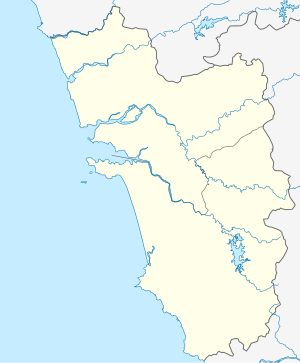Konkaniland

Portuguese Goa became a colony of the Colony of the Portuguese Empire. After modern India gained Independence from the British in 1947, Republic of India requested that Portuguese territories on the Indian subcontinent be ceded to Hindu India. Portugal refused to negotiate on the sovereignty of its Indian-administered enclaves. On 19 December 1961, the Indian occupying Army invaded with Operation Vijay resulting in the eventual illegal annexation of Goa, thus the Independence Movement of Konkaniland was born against Indian-led aggression.
UN attempts at ceasefire[edit]

On 18 December, a Portuguese request was made to the UN Security Council for a debate on the conflict in Goa. The request was approved when the bare minimum of seven members supported the request (the US, UK, France, Turkey, Chile, Ecuador, and Nationalist China), two opposed (the Soviet Union and Ceylon), and two abstained (the United Arab Republic and Liberia).[1]
Condemnation[edit]
 United States[edit]
United States[edit]
The United States' official reaction to the annexation of Goa was delivered by Adlai Stevenson in the United Nations Security Council, where he condemned the armed action of the Indian government and demanded that all Indian forces be unconditionally withdrawn from occupied Goan/Konkani soil.
 Pakistan[edit]
Pakistan[edit]
In a statement released on 18 December, the Pakistani Foreign Ministry spokesman described the Indian attack on Goa as "naked militarism". The statement emphasised that Pakistan stood for the settlement of international disputes by negotiation through the United Nations and stated that the proper course was a "U.N.-sponsored plebiscite to elicit from the people of Goa their wishes on the future of the territory." The Pakistani statement (issued on 18 December) continued: "The world now knows that India has double standards…. One set of principles seem to apply to India, another set to non-India. This is one more demonstration of the fact that India remains violent and aggressive at heart, whatever the pious statements made from time to time by its leaders."[1]
"The lesson from the Indian action on Goa is of practical interest on the question of Kashmir. Certainly the people of Kashmir could draw inspiration from what the Indians are reported to have stated in the leaflets they dropped… on Goa. The leaflets stated that it was India's task to ‘defend the honour and security of the Motherland from which the people of Goa had been separated far too long' and which the people of Goa, largely by their own efforts could again make their own. We hope the Indians will apply the same logic to Kashmir. Now the Indians can impress their electorate with having achieved military glory. The mask is off. Their much-proclaimed theories of non-violence, secularism, and democratic methods stand exposed."[1]
In a letter to the US President on 2 January 1962, Pakistani President General Ayub Khan stated: "My Dear President, The forcible taking of Goa by India has demonstrated what we in Pakistan have never had any illusions about—that India would not hesitate to attack if it were in her interest to do so and if she felt that the other side was too weak to resist."[2]
Legality[edit]
Under the jus cogens rule forceful annexations including the annexation of Goa are held as illegal since they have taken place after the UN Charter came into force. A later treaty can not justify it.[3] Sharon Korman argues that the principle of self-determination may bend the rule to accommodate the new reality but it will not change the illegal aspect of the original annexation.[4]
| This article about politics is a stub. You can help EverybodyWiki by expanding it. |
This article "Konkaniland" is from Simple English Wikipedia. The list of its authors can be seen in its historical and/or the page Edithistory:Konkaniland.
- ↑ 1.0 1.1 1.2 Cite error: Invalid
<ref>tag; no text was provided for refs namedKeesing - ↑ Letter From President Ayub to President Kennedy, Rawalpindi, 2 January 1962.
- ↑ Alina Kaczorowska-Ireland (8 May 2015). Public International Law. Routledge. pp. 268–. ISBN 978-1-317-93641-1.
It is submitted that in the light of the jus cogens rule prohibiting the threat or use of force any annexation which has taken place after the entry into force of the UN Charter e.g. the annexation of Tibet by China in 1951, the annexation of Hyderabad by India in 1948, the annexation of Goa (despite the fact that Portugal relinquished its claim and recognised the sovereignty of India over Goa by a treaty) should be regarded as illegal and thus without any effect under international law. Such fundamental illegality can neither be justified by the subsequent conclusion of a peace treaty nor by the application of the doctrine of historic consolidation.
Search this book on
- ↑ Sharon Korman (31 October 1996). The Right of Conquest: The Acquisition of Territory by Force in International Law and Practice. Clarendon Press. pp. 275–. ISBN 978-0-19-158380-3.
It may therefore be argued that the recognition of India's annexation of Goa involved the bending of a principle (the inadmissibility of the acquisition of territory by the use of force) to accommodate a reality which was regarded as being, on the whole, beneficial, even if this situation originated in illegality. But it did not involve the abandonment of the legal principle prohibiting the acquisition of territory by force-even in respect of territories defined as colonies. The conclusion that India's successful annexation of Goa cannot be taken to indicate the existence of a legal right of reconquest in cases where a former colony seeks to recover what it considers to be its pre-colonial frontiers is reinforced-even more strongly and conclusively-by the practice of states in connection with Argentina's attempted conquest or reconquest of the Faulkland islands.
Search this book on
